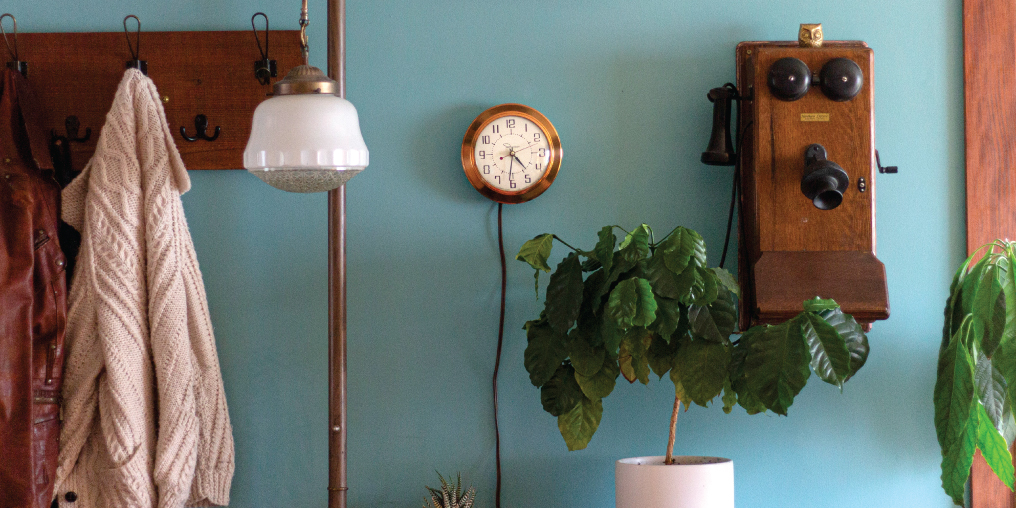I was asked to share my story with you, and to keep it short at that. Bit of a hard ask for an old clock, but I’ll do my best. If you have the time and patience, I’ll begin.
Time. Patience. I know them both intimately. They are built into the fabric of my being, etched into my once-gleaming copper case. My hands intersect the cyclical nature of time—always pointing, always saying “now, this time, right now.” Though, as you will see, they don’t always get it right.
My name is Ingraham. I was born in a clock factory in Toronto in the early 1960s. I began keeping time on the third of March, 1962, at 11:47 in the morning. After a quick test run, I was boxed up and shipped out with 24 of my cousins (all Ingrahams, the lot of us) to a Hudson’s Bay store in Vancouver. There I spent my infancy on display, and it was glamorous and glorious! I met Westcloxes and Sniders, Seth Thomases and Neon Rays. The ’60s were a heyday for clocks, and we took to the walls like swimmers take to the sea. Gone were the days of heavy pendulums and bulky wooden cabinets—we were bold, beautiful, and electric!
Myself, I went in for the minimalist look: smooth cream face, clean lines, bevelled copper case—my name written in flowing cursive, front and centre. The flashiest thing about me was my red second hand: a long, thin needle, anchored at the centre by a cheery red dot, dancing smoothly, silently through time. I was never one for centre stage, but there on display with me were the most magnificent starburst clocks you can imagine! They demanded attention—and a lot of wall space to boot.
I spent about four months at The Bay before my first humans found me. I was taken home, carefully unboxed, patiently set to the long dash and hung ceremoniously in the living room. So began my life as the great reference. The governor of routine. The hurrier-out-the-door. The master of time.
I soon discovered, however, that my favourite times were the ones I went unnoticed for hours on end. I adored Sunday, that strange day out of time when my humans all stopped rushing. Some clocks live for the measurement of time, for schedules and deadlines—the taskmasters of the world. Give them a busy office, let them whisper words of reprimand in the manager’s ear as you roll in five minutes late, and they’ve had a good day. That’s not the kind of time I care to measure.
We electric clocks are all born with the same basic fear programmed deep within our gears: the dreaded power outage. Oh, the horror! The loss of agency, of utility! But when it finally happened to me, well, it’s hard to describe. Time opened up. Expanded. Time unmeasured had an eternal quality. I got to stop running, stop pointing, stop shouting “Now! Right now!” at anyone who cared to listen. The humans lit candles, brought out board games, and stayed up way later than usual, letting the candles burn down. Oh, I still knew what time it was. That’s basic knowledge for any clock, ticking or not, but I wasn’t telling, and no-one was asking. Time took a back seat on those nights, and I loved it.
Some would say I loved it too much. That it isn’t decent for a clock to take pleasure in skirting time. I spent the next couple decades seriously questioning my own purpose and identity: I was a creature of time in the most literal sense, but I no longer wanted to tell of it. I began to grind my gears in protest, quietly at first, so that only the cat noticed, then increasingly louder, until I became unbearable. I was taken to the basement to be poked, prodded, and oiled—surprisingly lovely, I must say! All of this served to quiet me for a while, but it wasn’t long before my gears were grinding once more. A few more trips to the basement, and I was boxed up and shipped out.
It was the beginning of a bleak couple of decades for me. I won’t get into it too deeply; suffice it to say, I bounced around between various thrift stores, garage sales, and musty basements, always searching for a home where I could just observe time. But the humans who took me home in those dark years needed me to measure time. They couldn’t abide my noisy protests, however, and the sweet relief of being unplugged was always quickly followed by an eviction. How I envied the art in those houses—allowed to simply exist!
Then, one day, it happened. I was picked up at a garage sale by a woman with the warmest, softest hands. She turned me over, lovingly caressed all my dings and scrapes, and took me home. I tried not to get my hopes up, of course. I knew how this usually ended. She took me to a cozy cottage on the outskirts of Cumberland, surrounded by trees. The woodstove was blazing. I noticed immediately there were no other clocks in the house. She seemed so pleased that I was electric, that I didn’t tick like so many other analog clocks. (I had to agree. I could never get on board with ticking clocks—every second dripping with audible impatience.) She hung me in the entranceway above an out-of-service Grundig radio cabinet, the cracked shellac on his honey walnut veneer showing his age. Beside me was a retired, wooden, wall-mount telephone. I could almost see the whole cabin from my vantage point, it was so open. She set the time, 2:37 p.m., and plugged me in while I held my breath and waited. I wanted to stay so badly.
I held my breath for three whole days before I broke. Much as I longed to stay, if the price of my rent was to count each second of each day, I just couldn’t do it. I began to rumble and groan once more and, as expected, I was quickly unplugged. The familiar wave of relief mixed with sadness flooded my being. But then, I wasn’t boxed up or shipped out. I just hung there, cord dangling, hoping against hope that it might last.
And it did last. I got to stay. I had, at long last, found my human. For her, it was enough that I just was—so long as I was silent. There were good times ahead. I could feel it like a subtle current in my inner workings, despite the fact that I was unplugged.
This is not where my story ends, but it was the turning point. I gratefully surrendered my working days and joined the Grundig and the telephone in a life of rich conversation and deep contemplation. I finally had time to engage with the art I had long envied, and it turned out it had a lot to say! The woman eventually got another clock, a smaller, cheerful little cream and beige Westclox desk clock, also electric. He was more than happy to keep the time and offer whatever governance of daily routines was needed. He sat silently out of the way on the kitchen passthrough, only piping up when yet another confused guest looked up at me, bewildered at the time I had to offer—always 4:31, the time I was unplugged.
To be fair, technically, I was correct twice every day.





